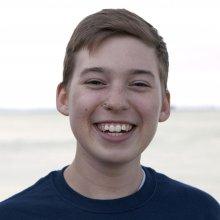
Marisa Borreggine
Tell us about your work / research. What kinds of things do you do?
I work in a lab that currently specializes in paleoceanography. This is the study of past ocean conditions, such as oxygen levels, sea ice presence, and biological community composition. This work is made possible mainly through proxies, which are things like volcanic ash layers in sediment cores we take from the sea floor. We use dating techniques to pinpoint when events like a volcanic eruption occurred. This work is really interesting and relevant today because understanding what the ocean used to be like, how it's changed, and why can tell us a lot about how it may change today. My lab tasks generally include online research, examining sediment samples through isotope chemistry, and picking out very tiny fossils from sediment samples to better understand the past and present ocean conditions.
What sparked your initial interest in your career?
I came to my university wanting to be a creative writing major. I took one oceanography class and knew that I had found my real passion. I have always valued the natural world as the purest and beautiful thing humans get to experience, and I knew that oceanography was a field that I could use to better understand and protect the world as we know it. Today, understanding how and why the ocean changes and how it affects us is really important. Paleoceanography is the best way to get answers to those questions, and we get to use really cool research methods to find those answers.
Who influenced you or encouraged you the most?
There was a time when I was on the fence about going into science because I had never really identified as a scientist. I remember when I saw the documentary "Chasing Ice" by James Balog and felt all at once how important the work environmental scientists are. I ended up meeting James Balog at a talk he gave in Seattle, where he told me that the work we do isn't easy, but it is worth it. He said that I should take the calling I felt to protect the earth and do some great science with it, and then I knew oceanography was for me.
What element of your work / study do you think is the most fascinating?
I really love the way science, especially paleoceanography and paleoclimatology, tells a story. I have a history minor, which also involves storytelling, and it is so interesting to me that oceanography and history can intersect like that. Every time we get results from analyzing a fossil community, or ash layer, or pollen sample, we are learning more about the ocean's story.
What other jobs led you to your current career?
I'm currently working at the first job I've ever had in the field of oceanography. I have worked many odd jobs before and in college, mainly as a barista, assistant, or waitress, so it is really amazing to work at a job that is so meaningful and impacts the natural world. My current research job definitely requires organization and communication skills, which I've picked up from years of working and training people in service jobs.
What are your degrees and certifications?
I'm currently finishing my Bachelor of Science in Oceanography at the University of Washington.
What are your hobbies?
I love long-distance running, hiking the many trails around Washington State and California, rock climbing indoors and outdoors, and I do a lot of reading and listening to podcasts.
What advice would you give to someone who wants to have a career likes yours?
If you're interested in oceanography, reach out to as many people as you can. My experience in the field has always been that people want to help you and will if you're just willing to ask. I have gained so many amazing and generous mentors just by being honest, asking questions, and being true to my research interests. Also, know it's okay to be unsure. I have taken so many opportunities I was unsure about, and even if I didn't love the scientific material, the skills I learned and people I met have stayed with me and helped me move forward in my career. Know when to ask for help and always question the answer.
How did you get involved with the Nautilus Exploration Program? How did you get on the ship?
In 2015, my mentor worked as an onshore scientist for Nautilus and needed me to do a biological survey of the ROV footage later in 2016. I was amazed at all of the unexplored areas of the seafloor and the amazing life that is found down there, and how much work there is to be done. My mentor recommended applying for the SEIP Ocean Science internship so I could get in on the exploration!
Expeditions
Marisa participated in the following Ocean Exploration Trust expeditions:
